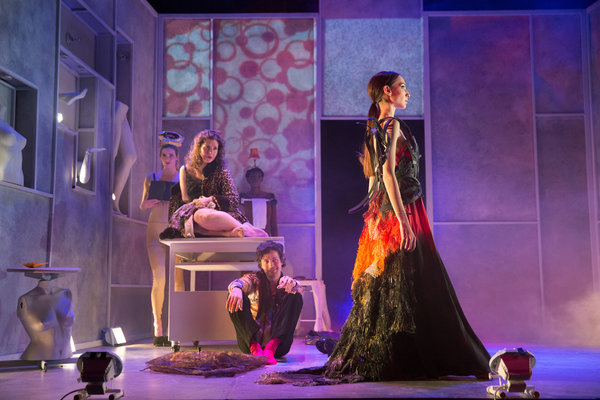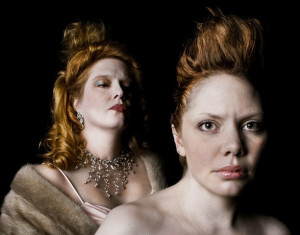Reconsidering Sheila Callaghan’s Fashion Play & EVERYTHING
A favorite Think Twice Drama, one that got me thinking about theatre blogging in the first place, is Sheila Callaghan’s EVERYTHING YOU TOUCH. Do you know this play? The work of Sheila Callaghan? If you don’t, you should . . . but proceed with your mind open and check your drama rules at the door.
This provocative and innovative author has written more than a dozen plays that have appeared in the best new-play theaters across the country. In EVERYTHING YOU TOUCH, she utilizes a breadth of poetic expression old and new, quantum leaps in plot, and a heartfelt examination of where the aesthetics of fashion beauty comes from and how it impacts the esteem of women and men.
An Ancient Catwalk in EVERYTHING YOU TOUCH
The play’s opening is both strange and familiar. One at a time runway models strut out in animal skins, antlers, feathers, horns. Tall, bone-thin, the women in their wild animal getups perform a ritual of tribal haute couture that is stylized, familiar, and more ancient than theatre. They are totem reminders that catwalks and hierarchal displays of beauty are as old as gathering around a communal fire.
It is spring 1974. The models are the creatures of Victor Cavanaugh, an East Village fashion designer. After the blond one, Piper, falls from spiked heels, Victor enters with all the tyranny of a vain child to berate the fallen young woman. His seething Dionysian rant serves as the Prologue. But the resonances with Greek theatre and Greek mythic culture don’t end there.
For days after seeing a preview of EVERYTHING there were echoes of the script, ghost images and words crackling in my head, weighting my thoughts until I had to experience it again. From the critical response I assumed there’d be the kind of fervor to understand this complex work that I was going through–but instead of awe, there was pushback for a play some considered beautiful to behold but shallow.
I didn’t get it. How could a play that had preoccupied me for weeks be shallow? This beauty is-only-skin-deep critique couldn’t be more ironic for a work that so thoroughly plumbs the effects of high fashion’s starvation aesthetics on the self- esteem of an ordinary woman. Not one review I read even considered the tricky ambiguity of the title. Did they see the same play? Just the ingenious use of the chorus in EVERYTHING YOU TOUCH could fill up pages of analysis.
Her Very Own Greek Chorus
Throughout the play the multi-tasking models function as a personal Greek chorus for the play’s central figure. The “everywoman” heroine Jess hasn’t lived up to the glamor expectations of her mother, a former model dying from cancer in Arkansas. Jess hasn’t seen her mother in over a decade, since she left for New York at eighteen. The three gorgeous stick women parading through her imagination are an ever-present blow to her self-esteem and a reminder of her fall from maternal grace.
When the chorus speaks, it speaks in eerie unison with the words of Jess’s mother: “You are so beautiful, Jess. And so skinny. Were you walking around in Mommy’s high heels this morning?” When they aren’t speaking or cat-walking—and that’s most of the time—the models are the dream-logic sculptures of things like gumball machines, office furniture, Thai food take-out, and motel nightstands with Gideon bibles.
But the EVERYTHING’s complexity goes well beyond the use of the chorus. A careful reading of the text reveals a wealth of insights, mythic and classical references, and sly poetry. Take for example Jess’s description of her mother.
. . . She buys Parliaments by the carton and lights up before her bowl of Special K every morning. She holds her cigarette high up in the knuckles and gestures casually it’s like the cigarette is a sixth finger. She likes to guess how much weight I’ve gained by looking at me. When I was growing up she filled my closet with beautiful, expensive clothes that were always a size too small, hoping I’d feel inspired to fit in them one day. . .
The metaphor of her mother’s cigarette as sixth finger comes early in the play and seems at first to be just a lovely detail. Given more thought and how it resonates with the play’s title and later symbolism, the cigarette finger is the death touch. The mother’s sixth finger, her deadly perfectionism, equates with the golden touch of Midas who couldn’t eat or drink because everything he touched turned to precious metal. In this ancient Greek myth, King Midas touched what he loved most in the world, his daughter, and turned her to a beautiful golden statue.
Smart New Play and Beautiful Ruin
For several of Callaghan’s dramas, literary classics have served as models. Dead City draws from James Joyce’s Ulysses and places the action in modern New York City. Her Fever/Dream reinvents Pedro Calderon de la Barca’s Life is a Dream. The play most related to EVERYTHING YOU TOUCH, Lascivious Something, takes place on a Greek Island and forays into the themes and dramaturgy of Greek tragedy.
In an interview for Women’s Project Theater, Callaghan speaks to her tendency to draw from literary tradition and radicalize it. “I want to make you feel like you’ve just seen something old and new at the same time—an ancient tale strutting around in a new blazer.”
In light of this, consider the self-appraisal of a tragic heroine isolated from the aftermath of the Trojan War.
No, most of my life has trickled past and left me
Without any hope. All my strength is ebbing.
Wasting to nothing without any children,
Needing the sheltering love of a husband.
I work as a slave in the house of my father,
As though I were just a contemptible foreigner.
I wear mean shabby clothes
And eat standing by myself at mealtimes.
These words come from the title character of Electra, one of the seven extant tragedies of Sophocles. Along with the shabby clothes and sad mealtimes, the lives of Electra and Jess compare and contrast in intriguing ways. In this speech and others, Electra parlays with her psychological entourage, a private chorus whose role is to soothe. This use of the chorus is unusual in Greek drama, Sophocles’ departure from its role as civic philosopher. Electra’s chorus attempts to console her “sullen soul” and even offers maternal love: “Dear child, I wish you kindly./ Please trust me like a mother./Your folly’s breeding ruin.”
Jess, too, has her own chorus, but a cruel one who chides her about her weight. “If your father were alive he’d be mortified at what you’re doing to yourself.” Her chorus speaks in the voice of her actual mother, Esme, a name that seems borne from the name of Electra’s mother, Clytemnestra—sister to the Trojan War’s runaway wife, Helen. Both Jess and Electra suffer from a personal pollution brought on by beautiful hawkish mothers.
Fallout from the Trojan War and Other Personal Problems
For Electra the past is always present. That her mother and her lover Aegisthus murdered her father Agamemnon never strays from her mind. After Clytemnestra has a nightmare about Agamemnon returning to life and ruling again, she sends her obedient daughter Chrysothemis with funeral offerings to place on his grave, libations to appease his spirit. Electra intervenes and they pray to their father for the return of their brother Orestes. Sophocles’ whole play is a portrait of Electra’s resolve to have her father avenged by her brother.
Alienated by office work, Jess drinks bad coffee to remind herself that she is not made of pixels and page hits. “I am capable of feeling wetness,” Jess tells us. “I am human.” The past is always present for her too, but in a different way. She has never met her own father, the fashion designer Victor who first appears in the Prologue. Victor took his own life when she was two and Jess must come to grips with her father’s undoing in order to face her dying mother. She must face her family history. To begin this, Jess goes to a bar and plays libation bearer.
Upping the ante on her Electra complex, she imagines sex with a thin cruel ghostly stranger, stroking his body afterward in the in-between spaces. “And from these I’ll build out my father. Shape him from dust and aromas and smoke and breath and everything else in the invisible world.” That’s when Victor shows up, looking just as he does in the seventies timeline. He says about the bar’s atmosphere, “Pretty dead in here.” Jess does her version of bearing her father a libation. She buys Victor a drink. After she observes that a martini isn’t a man’s drink, he answers, “I’m not really a man. I’m a filthy, bratty, terrible baby.” He tells her that food is for the weak and women who hate themselves. They drink to low self-esteem.
The Heroine’s Creative Touch
Victor is made of pixels and dust we are reminded for the rest of the play. In the bar scene he is Jess’s newborn, a creation she has “touched” into existence, her version of the Pygmalion / Galatea myth, the positive counter-weight to the Midas touch. As they drive to Little Rock to visit her mother, Victor convinces Jess to stop “fooding” and glam it up for the peace process with the former model. Early on in Jess’s encounter with him, he is the death-touch father who serves up schoolyard insults about the size of her butt. Gradually he is transformed from being Esme’s Victor, mortified by her eating habits, to being Jess’s Victor. It is his internal growth during the road trip, not her makeover, how he changes in the imagination of Jess that is of interest.
Midway through the play, Victor tells Jess that the fabric for the outfit he is wearing came from Guatemala. This is his second mention of his trip to Central American; with the first, he berates the model Piper, for lacking the “barbaric elegance” he saw there and she hangs herself from a lighting fixture in her mother’s kitchen—another death-touch image. Victor admits to spending time in Guatemala after losing his mind, which was after his sister died. “She um. Withered away in childhood sickness. Went from apple-cheeked to gaunt and brittle in a matter of weeks. ” This gentler, more fatherly Victor reveals that his sister’s death is at the core of his artistic credo of decimation. “Rewrite the dying process. / Take things that’ve been ravaged/ And make them ravishing.”
Because the Greek chorus and Victor exist in Jess’s imagination, it is reasonable to allow that her powers over this drama may not stop there. The other plot, in which rival muses Esme and Louella vie for Victor, features a Victor that looks exactly as he does some thirty years later in Jess’s plot. Veteran reviewer Myron Meisel of the Hollywood Reporter suggests that the older plot is an imaginary history. The events in Victor’s East Village designer shop are projections of Jess’s need to know how her model mother and designer father split up as she was finding her way into the world.
This theory is supported by the telltale quantum shifts in time. In the first scene that features Esme, she is consoling Victor after Piper takes his jab to look like a Sunday suicide too literally. “I shouldn’t have said any of that stuff to her,” Victor says. “I was imitating a self that no longer exists.” His guilt over Piper’s sad end has thrown into question his existence as an artist and a haughty Esme offers pity sex. The scene concludes with her dropping her panties and lifting her dress: “Don’t get me sweaty. I want to wear this to the Missoni dinner tonight.” Then the lights come up on the self-pitying Jess, the product of the pity sex Esme gives to Victor. The implication, in retrospect, is that Jess has just finished visualizing how she was conceived.
Later after Jess invites the pixel Victor to drive south with her, there is another telling shift in timelines. The play jumps to the arrival of Louella, Esme’s rival from Little Rock, who shows up in the East Village shop with cupcakes. Louella offers the opposite extreme to Esme’s dark exclusivity, a sunny inclusive aesthetics. In due time Victor will choose the life-affirming muse Louella over the death-instinct muse Esme, once “the soul of the Victor Cavanaugh line.” This choice plays out catastrophically as Esme is pregnant with Jess. The two women swap places. Louella takes up with Victor in his East Village apartment and pregnant Esme moves to Little Rock and lives in Louella’s former residence.
The Trumpet in the Closet
Esme’s handing over of the keys to Louella makes for an astonishing scene. Five-months pregnant, “looking as if she ate the fucking sun,” as Victor puts it, Esme cloaks her jealous rage, just barely, with advice for cohabitating with the fashion designer. She tells Louella what she needs to know, that is, what not to touch.
. . . Don’t touch his fabrics, don’t touch his sketches, don’t move his soaps in the bathroom, he’s weirdly anal about that. Don’t drink that whiskey, it was a gift from a famous designer. Don’t clean. He’s weird about that. Don’t answer the phone. The trumpet in the closet was his sister’s who died of leukemia so don’t touch that. The TV doesn’t work, and neither does the toaster. Don’t wash the wine stain off the counter. Don’t lay a finger on any garment on any surface or hanger. . .
This is just part of Esme’s “everything you don’t touch.” It contains the most revealing, significant untouchable item of all: the trumpet in the closet. Here is symbolic evidence of the sway the sister’s death by leukemia has held in Victor’s life, how his view of beauty has been defined by death, the brassy silence of a band instrument in a coffin, the golden touch of a sister who withered away. His love of the bone-thin ghastly standards of beauty and fashion comes from his Edgar Allen Poe-like compulsion to blur the boundaries between life and death, to keep his sister alive. No one understands this better than Esme, who, in order to rule Victor’s heart, has modeled her approach to fashion after his devotion to a dead sister.
Gender Complicity in EVERYTHING
EVERYTHING YOU TOUCH reveals how both parents—and therefore both genders—share in the sadistic anti-life doctrine that has molded Jess’s existence. Paradoxically, if it were not for Esme choosing life, she would have never been born as Victor casts out his pregnant muse. “You’re not parent-material,” he says. “I’m not parent material.” Esme asks, “What kind of material am I?” Victor tells of his new Louella-inspired fashion line, of participating in humanity and the larger conversation. Esme retorts, “You wanna participate in humanity. Well you helped create some. Right here. Participate.”
Years later the Cavanaugh line ends up on the sale rack at Dillard’s. A shattered Victor visits his former dark muse in Little Rock. Esme gets even by withholding two-year-old Jess, a daughter deprivation that proves fatal.
For the final mother/daughter confrontation no words are exchanged as Esme has lapsed into a coma. With tubes up her nose, she is rolled out on a cot, a modern equivalent of the ekkyklema, in Greek drama the means for displaying the dying or dead. “I’m wearing high heels,” Jess says to her comatose mother.
And then there’s the banging on the door from another time. It’s Victor from the past shouting through the door, “I just want to see her, Esme. You could go into the other room if you want. I won’t even hold her. I might hold her.” Esme leaps out of bed and into the past, to smoke and taunt and refuse visitation. Having stowed their daughter with a neighbor, she lets Victor in and tells him how skinny, gorgeous, and angelic the two-year-old Jess is, how she’s going to be a stunning model. And having played the dead sister card for the last time, Esme sneers at that fall of the Cavanaugh line and his artistic standards. “You can die now,” she says and Victor concedes.
From here time vaults forward to Esme’s vicious parting words to Jess. “Happy eighteenth birthday, you ungrateful bag of garbage./ Go get on that Greyhound bus.” In this blistering attack she accuses teen-age Jess of ruining herself. “If your father were alive?/ He would be DISGUSTED BY YOU.”
The play ends with present-day Jess staying with comatose Esme until she dies. She takes Esme’s most beautiful dress, the one Victor created to say “Autumn and spilled mimosa and butt-sex and laughter.” Jess lays the gown on Esme’s body and the models lift her body and exit for the last time as a funeral procession. Jess gives back the self-hatred she inherited from her mother.
EVERYTHING YOU TOUCH was a joint production of Rattlestick Playwrights Theater and Theatre at Boston Court.






May I just say what a comfort to find someone that truly understands what they’re discussing online.
You actually understand how to bring a problem to light and make it important.
A lot more people have to look at this and understand this side of your story.
I was surprised you aren’t more popular because you surely possess the gift.
Thank you so much for the lovely compliment! think twice drama is a new site and I’ve been focussing on the posts, just now getting the word out.
EVERYTHING YOU TOUCH is such a terrific, layered play. The more I look into the references, the more interesting it becomes.